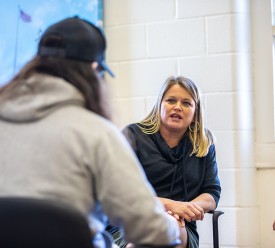Help others get their lives back.
Addiction impacts many people's lives, either directly or indirectly. Online master’s degree programs in addiction counseling prepare you to face the world of addiction head-on and help free those struggling with substance abuse - whether that's opioids, alcohol, or other addictive substances or behaviors. Not only will your clients get their lives back when they get their substance use under control, but their loved ones will also benefit.
The master’s in addiction counseling online program at University of the Cumberlands aligns with ICRC standards and prepares students to become Licensed Alcohol and Drug Counselors (LADC) in Kentucky. If you need an online degree program that gives you the knowledge and skills required to work in this life-changing profession, look no further; this is the place.
Programs & Requirements
Online Master of Arts in Addiction Studies
Addiction is more than a disease; it cripples those who are addicted and those that love them. With the right knowledge and skills, you can become a solution in the lives of many as an addiction professional who is capable and compassionate enough to guide their journey to recovery. At University of the Cumberlands, our faculty of caring experts will help you develop the skills necessary to work with a population in desperate need of overcoming their addictions. Your master's in addiction counseling coursework will help prepare you for special licensure in Kentucky as a Licensed Alcohol and Drug Counselor.
The Master of Arts in Addiction Studies is designed to trains students with the knowledge and skills needed to work in settings that treat substance use disorders. The degree aligns with ICRC standards and prepares students to become Licensed Clinical Alcohol and Drug Counselor (LDAC) in the state of Kentucky.
Course Requirements
- COUN 533 - Legal and Ethical Issues in Counseling
- COUN 535 - Psychological Assessment in Clinical Practice
- COUN 636 - Theory and Practice of Multicultural Counseling
- COUN 637 - Group Counseling
- HSRV 531 - Motivation, Change, and Treatment in Addictions
- HSRV 532 - Psychopharmacology & Addictions
- HSRV 533 - Family Therapy in Addiction Treatment
- HSRV 534 - Clinical Management of Addictions
- HSRV 535 - Co-occurring Disorders
- HSRV 536 - Advanced Topics: Street Drugs
Take the Next Step
Mission & Goals
The mission of the master's in addiction studies is to teach screening, assessment, and engagement, treatment planning, collaboration, and referral, counseling, and professional and ethical responsibilities.
Addiction Studies Careers & Outcomes
All stats from U.S. Bureau of Labor Statistics
Substance Abuse Counselor: $49,710
Substance Abuse Counselor: $49,710
Substance abuse, behavioral disorder, and mental health counselors advise people on a range of issues, such as those relating to alcoholism, addictions, or depression.
Rehabilitation Counselor: $39,990
Rehabilitation Counselor: $39,990
Rehabilitation counselors help people with physical, mental, developmental, or emotional disabilities live independently.
Social Worker: $55,350
Social Worker: $55,350
Social workers help people prevent and cope with problems in their everyday lives.
Human Service Assistant: $38,520
Human Service Assistant: $38,520
Social and human service assistants provide client services in a variety of fields, such as psychology, rehabilitation, and social work.
Substance Abuse Social Worker: $51,240
Substance Abuse Social Worker: $51,240
Assess and treat individuals with mental, emotional, or substance abuse problems, including abuse of alcohol, tobacco, and/or other drugs. Activities may include individual and group therapy, crisis intervention, case management, client advocacy, prevention, and education.
Correctional Treatment Specialist: $59,860
Correctional Treatment Specialist: $59,860
Probation officers and correctional treatment specialists assist in rehabilitating law offenders in custody or on probation or parole.
Common Questions
With the online master’s in addiction studies degree program from University of the Cumberlands, you'll be on track for special licensure in Kentucky to become a Licensed Alcohol and Drug Counselor (LADC) upon completion of experiential hours and other requirements. Many graduates become substance abuse and behavioral disorder counselors, also known as addiction professionals.
Some addiction professionals may go on to start private practices or manage teams of mental health professionals. Other counseling and mental health career paths you could pursue with a master’s in addiction studies may include:
- Health Educator
- Social Administrator
- Rehabilitation Counselor
- Regulatory Affairs Director
- Postsecondary Teacher
In a master's in addiction studies degree program, you'll develop the skills necessary to apply intervention and prevention theories, models, and approaches in individual or group settings. You'll also be able to articulate knowledge, skills, and best practices related to addiction studies, and select appropriate assessments to evaluate, diagnose, and develop a treatment plan for clients.
Earning your master's in addiction counseling online is a flexible way to launch a new career that makes a difference. Here's how to get started:
- Check your state's requirements. State requirements for counselors can vary, but one thing is sure: Addiction counselors in private practice must earn licensure. In all states, this requires a master's degree and anywhere from 2,000 to 4,000 hours of clinical experience. Check with your state for specifics, and make sure the online addiction studies degree program you're considering meets all specifications. Kentucky recently passed a bill creating an alcohol and drug counselor credential that requires a 30-hour master's degree and focuses on addiction studies. This bill allows recipients of the 30-hour master’s degree in addiction studies to become Licensed Alcohol and Drug Counselors (LADC) upon completion of experiential hours and other requirements.
- Choose the online degree program that suits your career goals. Not all online addiction studies programs are suitable for those who wish to become licensed counselors. These programs could help you prepare for many rewarding human services career paths that do not require licensure.
- Apply, enroll, and start learning! A master’s in addiction counseling online degree program offers the flexibility you need to study on your schedule. In many cases, you can complete your coursework in less than two years of full-time study.
Depending on your state and employer, earning a master's in addiction studies may be required to launch your career in addiction studies. Here's why many students find it worthwhile to pursue a master's degree in this growing field:
- Job opportunities. Substance abuse and behavioral disorder counselors, along with mental health professionals, are currently in high demand. According to the Bureau of Labor Statistics, these roles should see 23 percent growth by 2030, faster than average for all professions.
- Making a difference. Addiction counseling professionals and other mental health and human services workers play a vital role in society. These days, more people are willing to try counseling when they need help, and there's an increasing need for counselors to work with at-risk populations, such as veterans. Additionally, many states now require drug offenders to seek treatment and counseling as a humane—and more effective—alternative to jail sentences.
- A return on investment. In 2021, the top 10 percent of addiction professionals earned more than $77,980 per year, while the median salary for this role was $48,520. But investing in your education is about more than a paycheck. Addiction professionals play a critical role in patient recovery, changing lives and communities for the better.
Time to completion depends on a number of factors, such as your schedule outside coursework, but it is possible to complete University of the Cumberlands' master's in addiction studies online degree program within one year. Taking two classes (6 credit hours) per bi-term equates to four classes (12 hours) for one full semester. With three semesters available each year, a full-time student can complete all 30 credit hours (10 classes) in one year.
Each course lasts eight weeks, called a bi-term. There are two bi-terms per semester, and three semesters per year (fall, spring, and summer). Many classes are asynchronous, meaning there is no set login time; you can work on schoolwork whenever you find time. Cumberlands provides free rental textbooks to online students as part of its One Price Promise.
Faculty Experts
Learn about UC's addiction studies professors.

Dr. Michael Verona

Dr. Angelica Woods-Smith

Dr. Mary Hermann
Request Information
Ask us any questions you have, and we'll get back to you soon.

